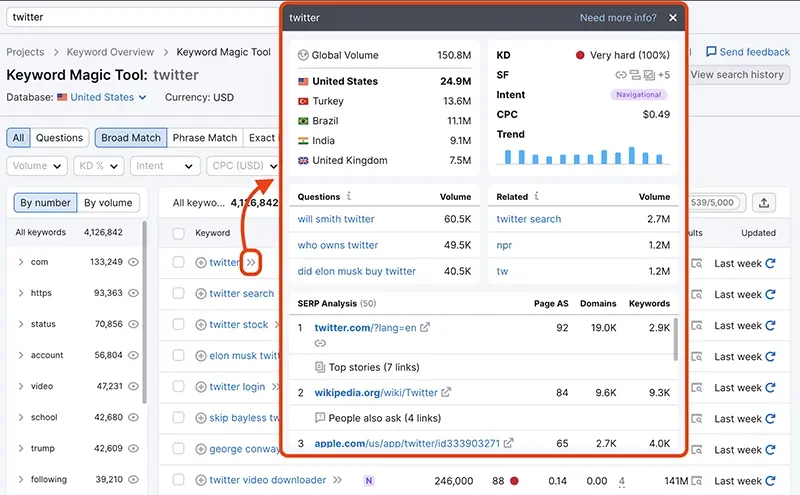
Search volume for keywords refers to the number of times a specific keyword or key phrase is searched for within a given time frame, typically on search engines like Google. It is an important consideration to take into account when conducting keyword research. By analyzing search volume data, website owners and marketers gain valuable insights into user behavior, trends, and the level of competition for particular keywords.
Keywords form the foundation of SEO, as they are the words and phrases people use to search for information, products, or services online. When developing an effective SEO strategy, it is essential to comprehend the search volume associated with these keywords. This article will delve into the concept of keyword search volume, its significance, how to determine it, and its applications in optimizing content for search engines.
Understanding of Search Volume for Keywords
Keyword search volume represents the quantifiable demand for specific keywords. It indicates how frequently users search for those terms, offering insights into their popularity. By understanding the search volume, website owners can identify high-demand keywords and tailor their content accordingly. Moreover, it helps in evaluating the potential traffic and competition associated with particular keywords.

How to Determine Keyword Search Volume?
To determine keyword search volume accurately, various tools and platforms are available. These tools provide valuable data that aids in making informed decisions for SEO and content creation. Some of the prominent tools for keyword search volume analysis include:
- Google Keyword Planner: This free tool by Google allows users to discover keyword ideas, analyze search volume trends, and estimate traffic potential for specific keywords.
- SEMrush: A comprehensive SEO tool that provides search volume data, keyword difficulty scores, and competitor analysis.
- Ahrefs: Known for its robust backlink analysis, Ahrefs also offers keyword search volume data and keyword suggestions.
- Moz Keyword Explorer: Moz’s tool provides accurate search volume data, keyword difficulty analysis, and organic click-through rates.
Of note, regional keyword search volume refers to the analysis of search volume data specific to a particular geographic region. Understanding regional search volume allows businesses to tailor their SEO efforts to target local audiences effectively and capture relevant organic traffic from specific locations. By considering regional search volume, businesses can optimize their content to meet the unique needs and preferences of their target markets.
Interpreting Keyword Search Volume Metrics
High Search Volume Keywords
Keywords with high search volumes typically indicate popular and competitive terms. These keywords attract a significant amount of traffic but also face fierce competition from other websites. Targeting high search volume keywords can be advantageous for broad reach and visibility, especially for established websites or brands looking to maintain their dominance.
Low Search Volume Keywords
On the other hand, low search volume keywords have fewer monthly searches. While the overall traffic potential might be lower, these keywords often have less competition, making it easier to rank higher in search engine results. Targeting low search volume keywords can be beneficial for niche websites or businesses aiming to attract a specific audience.
Seasonal and Trending Keywords
Search volume for keywords can fluctuate based on seasonality or trending events. Seasonal keywords experience significant spikes in search volume during specific times of the year. Trending keywords, on the other hand, are related to current events or popular topics that experience a sudden surge in search volume. Identifying and capitalizing on these keywords can help website owners align their content with user interests and maximize traffic during peak periods.
Using Keyword Search Volume for SEO
Keyword Research and Targeting
Keyword search volume data plays a critical role in keyword research. By identifying keywords with high search volumes and moderate competition, website owners can prioritize their content creation efforts. Keyword research helps in understanding user intent and crafting content that aligns with their needs and expectations.
Content Optimization and Creation
Analysis of search volume for keywords guides content creators in optimizing their existing content and developing new articles, blog posts, or landing pages. By incorporating keywords with substantial search volume, website owners increase the chances of their content appearing in relevant search results and attracting organic traffic.
Competitor Analysis
Analyzing search volume for keywords can also aid in competitor analysis. By understanding the search volumes for specific keywords in their niche, website owners can identify gaps, untapped opportunities, and areas where they can differentiate themselves. This knowledge helps in developing a competitive SEO strategy.
Limitations of Keyword Search Volume
While search volume for keywords is a valuable metric, it has certain limitations that should be considered.
Accuracy and Variability
Keyword search volume data provided by various tools may not always be entirely accurate. Search engines like Google may restrict access to precise search volume numbers, and the data provided by third-party tools is often an estimation. Additionally, search volumes can vary over time due to changes in user behavior, algorithm updates, or the introduction of new technologies.
User Intent and Long-Tail Keywords
Keyword search volume alone does not provide insights into user intent. Users may search for the same keyword with different intentions, leading to varying conversion rates. Long-tail keywords, which are more specific and less competitive, may have lower search volumes but can attract users with high purchase intent. An estimated 90% of all search traffic comes from long-tail keyword searches. Balancing search volume with user intent is crucial for effective keyword targeting.
Conclusion
Search volume for keywords is an important consideration for SEO. Understanding the demand, competition, and trends associated with specific keywords empowers website owners to optimize their content effectively. By conducting thorough keyword research, targeting relevant keywords, and creating valuable content, businesses can increase their online visibility and attract targeted organic traffic.















